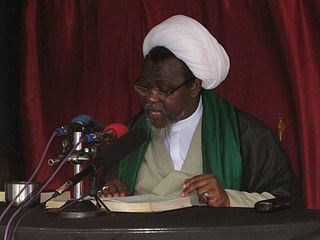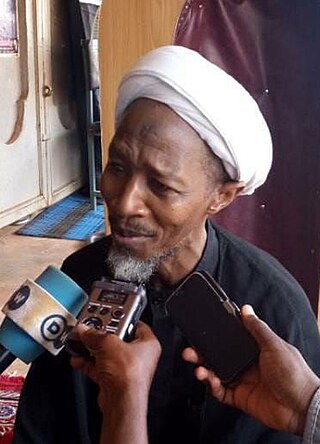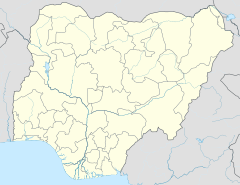
Kaduna is a state in the northwest geopolitical zone of Nigeria. The state capital is its namesake, the city of Kaduna, which was the 8th largest city in the country as of 2006. Created in 1967 as North-Central State, which also encompassed the modern Katsina State, Kaduna State achieved its current borders in 1987. Kaduna State is the fourth largest and third most populous state in the country, Kaduna State is nicknamed the Centre of Learning, owing to the presence of numerous educational institutions of importance within the state such as Ahmadu Bello University, Nigerian Defence Academy, Air Force Institute of Technology (AFIT), Kaduna Polytechnic, etc.

Zaria is a metropolitan city in Nigeria, located at present time within four local government areas in Kaduna State. It serves as the capital of the Zazzau Emirate Council and is one of the original seven Hausa city-states. The local government areas comprising Zaria are Zaria, Sabon Gari, Giwa, and Soba local government areas of Kaduna State, Nigeria.

After the death of Muhammad in 632, the Muslim world split into two camps, the Sunnis, who believed that the caliphs of the Islamic community should be chosen by a council, and a second group, the Shia, who believed that Mohammed had named his successor to be Ali ibn Abi Talib, his cousin and son-in-law.
Although the majority of the Nigerian Muslim population is Sunni, there is a small Shia minority, particularly in the northern states of Kano and Sokoto. However, there are no actual statistics that reflect a Shia population in Nigeria, and a figure of even 5% of the total Nigerian Muslim population is thought to be too high “because of the routine conflation of Shi’a with Sunnis who express solidarity with the Iranian revolutionary program, such as those of Zakzaky’s Ikhwani.”
The Islamic Movement of Nigeria is a banned Shia religious organization which aims to establish an Islamic state in Nigeria. It was founded by Ibrahim Zakzaky, who was inspired by the Iranian Revolution and rejects the authority of the Nigerian Government. The movement focuses on a nonviolent approach toward achieving an Islamic State, which has established some legitimacy as an alternative government. The IMN is headquartered at the spiritual center, Husainiyya Baqiyatullah, in Zaria with the group's numbers estimated around 5% of Nigeria's Muslim population of 100 million. While the main focus of the group is Islamic studies and enlightenment, Zakzaky has also encouraged his followers to pursue Western education and engage in charity work. Currently, the leader of the movement, Zakzaky, was in jail recently, and the group organized protests for his release that have resulted in conflict with the Government.

Ibraheem Yaqoub El-Zakzaky is a Nigerian religious leader. An outspoken and prominent Shi'a leader in Nigeria, he has been imprisoned several times for what he sees as injustice, especially the system of corruption in his country. Zakzaky claims that only Islam can offer solution to the complex socio-political problems facing Nigeria, which has over the years stagnated the country's development. In a lecture he has delivered in marking the occasion of Sheikh Uthman Bn Fodio Week organized by the Academic Forum of Islamic Movement, Zakzaky stated that he is continuing the Jihad of Uthman Bn Fodio to make sure that Islam becomes the ruling religion in not only Nigeria but the entirety of West Africa. In a lecture he delivered on the same occasion in Sokoko, one of his proponents, Dr. Nasir Hashim has claimed that Zakzaky’s dream is the only hope for Africa.
Shia Islam in Africa is the continent's second most widely professed sect of Islam behind Sunni Islam.
Idris Garba was the Military Governor of Benue State from 1987 to 1988 and Governor of Kano State from 1989 to 1992.
Religion in Kaduna State is a secular state, with Christian, Muslim and some indigenous religious adherents. The Sharia is valid for the areas with a mainly Muslim population. The leader of the Sufi Tijaniyyah brotherhood is Sheikh Dahiru Usman, and Sheikh Ibraheem Zakzaky is the leader of the Shia Islamic Movement in Nigeria.

Anti-Shi'ism is hatred of, prejudice against, discrimination against, persecution of, and violence against Shia Muslims because of their religious beliefs, traditions, and cultural heritage. The term was first used by Shia Rights Watch in 2011, but it has been used in informal research and written in scholarly articles for decades.

Religious violence in Nigeria refers to Christian-Muslim strife in modern Nigeria, which can be traced back to 1953. Today, religious violence in Nigeria is dominated by the Boko Haram insurgency, which aims to establish an Islamic state in Nigeria. Since the turn of the 21st century, 62,000 Nigerian Christians have been killed by the terrorist group Boko Haram, Fulani herdsmen and other groups. The killings have been referred to as a silent genocide.
Zaria Quds massacres refers to an incident on 25 July 2014, when the Nigerian Army opened fire on members of the Islamic Movement who were taking part in Quds day rallies, and killed 35 people, including three sons of Ibrahim Zakzaky, leader of the movement. The Islamic Movement and Islamic Human Rights Commission claimed that Nigerian government's ties with Israel were responsible for the attacks on the pro-Palestinian group.
The following lists events that happened during 2016 in Nigeria.
Shia Muslims have been persecuted by the Islamic State (IS), an Islamist terrorist group, since 2014. Persecutions have taken place in Iraq, Syria, and other parts of the world.

Qasim Umar Sokoto was a contributor to the Islamic Movement of Nigeria, the prayer leader and Islamic teacher in Sokoto, the Northern city of Nigeria.

The Presidential Guards Brigade is the only guard of honour and protective security unit brigade of the Nigerian Army (NA) responsible for counterintelligence to prevent assassination or sabotage of the Aso Rock Presidential Villa, crowd control in the event of chaos, important ceremonial duties in various ceremonies, protecting the President of Nigeria, public security, and support military operations. The members of the brigade are a group of Nigerian soldiers who guard the residence of the President and his guests, as well as perform ceremonial duties. Also referred to as the Brigade of Guards, this unit, according to AllAfrica with reference to a senior army official, "does not answer to Army Headquarters or to the Chief of Army Staff in any operational matters and its commander is completely integrated into the President's security team."

On the night of 20 October 2020, at about 6:50 p.m., members of the Nigerian Army opened fire on unarmed End SARS protesters at the Lekki toll gate in Lagos State, Nigeria. Amnesty International stated that at least 12 protesters were killed during the shooting. A day after the incident, on 21 October, the governor of Lagos State, Babajide Sanwo-olu, denied reports of any loss of lives, but later admitted in an interview with a CNN journalist that "only two persons were killed".
The Ahmadu Bello University (ABU) is a public research university located in Zaria, Kaduna State, Nigeria. It was opened in 1962 as the University of Northern Nigeria. The university has four colleges, three schools, 18 faculties, 110 academic departments, 17 centres, and seven institutes with over 600 professors, about 3000 academic staff and over 7000 non-teaching staff. The university has over 400 postgraduate programmes reflecting its strife to become a postgraduate studies-centred university. The university operates from two campuses in the ancient cosmopolitan city of Zaria, the Samaru Campus where the Senate Building and most of the faculties are located and the Kongo Campus, hosting the faculties of Law and Administration. It has been adjudged to be the largest university in Sub-Saharan Africa, in terms of land occupied, owing to the numerous buildings it has.









